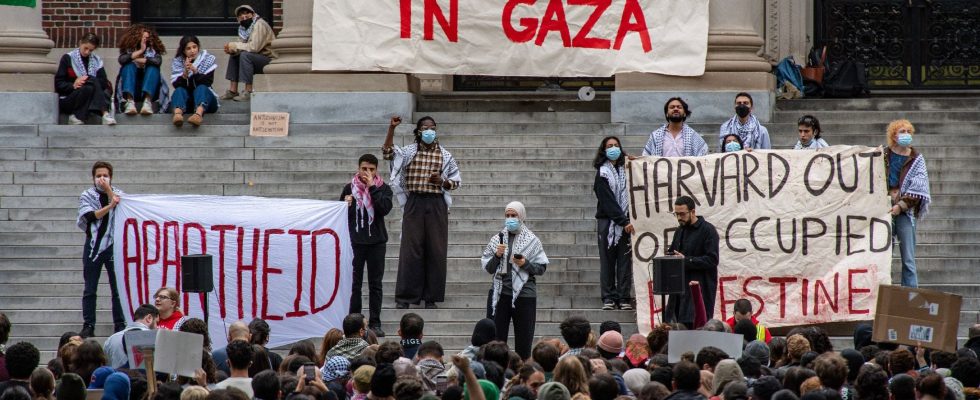Hundreds of arrests, riot police facing students who do not let up: the tension remained electric, Thursday, April 25, on American campuses, where the protest movement against the war in Gaza is becoming widespread across the country .
From Los Angeles to Atlanta, from Austin to Boston, via Chicago, the movement of pro-Palestinian American students is growing by the hour after leaving Columbia University in New York more than a week ago. York. Some of the most prestigious establishments in the world are affected, such as Harvard, Yale and Princeton.
In Columbia, evacuation postponed
The pro-Palestinian American student movement, which has become widespread on American campuses, began more than a week ago at Columbia University in New York. Concretely, they are mobilizing against their university’s investments in companies participating in the Israeli war effort. Many students set up a solidarity camp within the establishment to protest against the war in Gaza. On Thursday, April 18, 108 student protesters at Columbia University were arrested.
For its part, the establishment postponed the deadline from Friday to midnight (local time), set for pro-Palestinian students to evacuate the campus. “Negotiations have progressed and are continuing as planned,” said the office of the president of the New York university, Minouche Shafik, in a press release published Thursday April 25. “We have our demands, they have theirs,” continues the presidential office, denying that police intervention was requested. Their encampment hampers the administration, while fueling fear of anti-Semitism.
But the protesters intend to stay on the lawn: “They call us terrorists, they call us violent. But the only tool we have is our voices,” declared one of the students present at the pro-Palestinian rally, introducing herself under the name Mimi.
At Yale, around forty people arrested
On the campus of Yale University, north of New York, hundreds of students waved pro-Palestinian flags and signs. Sunday April 21, “more than 600 people” had gathered” in order to protect “more than 40 tents”, according to the student press release. At least 47 people were arrested, again according to the same source, Monday April 22. The latter were charged with “criminal trespass”.
During the night from Monday to Tuesday, around fifty demonstrators were also arrested. On the Instagram website “OccupyYale“, we can read in the caption: “Yale, you have intimidated us, criminalized us, you have militarized our campus, and you have not accepted our demands. We won’t stop, we won’t rest until we get disclosure [des liens avec la production d’armes] and divestment?”
At Harvard, 500 people gathered
Harvard, the oldest university in the United States, in the suburbs of the historic city of Boston, also saw, on Wednesday April 24, a camp set up on its lawn in front of the statue of John Harvard. Pro-Palestinian organizers are protesting Monday’s April 22 suspension of the Harvard Undergraduate Palestine Solidarity Committee and demanding that the university disengage from Israel’s war in Gaza. At its peak, the movement brought together 500 protesters.
It was the largest protest on Harvard’s campus since the resignation of former university president Claudine Gay in early January. In an interview Monday, April 22, Harvard Interim President Alan M. Garber refused to rule out the use of police in response to student protests, but said there would be a “very, very high bar ” before their involvement. University officials remain staunchly opposed to calls to boycott Israel.
At Princeton, two students excluded
Protesters set up tents for a student-led pro-Palestinian encampment on Thursday, April 25, according to the university’s website. About a hundred people held banners and sat on the ground to protest. After warnings from university officials, two Princeton students were arrested and the remaining protesters packed up their camping gear and continued the protest as a sit-in.
The two graduate students were immediately removed from campus, pending disciplinary proceedings,” the school announced. Jennifer Morrill, a spokesperson for the University, confirmed in a statement that pitching tents violated University policy.
